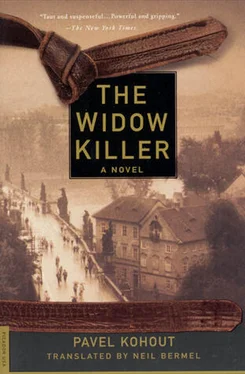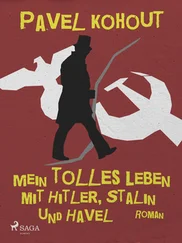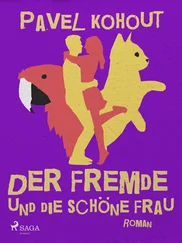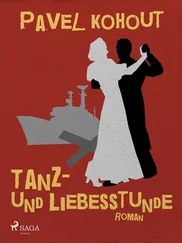Onlookers gawked at the battle sites, and the diligent cleared away the debris blocking passages. For safety’s sake, the heroic announcers moved into a hurriedly equipped studio in an air-raid shelter. Doctors descended on the building, examining the lightly wounded on the spot, and sending the severely wounded off to various hospitals. The fallen were carried down to the courtyard.
This was where Morava stationed what seemed like the more reliable civilians, instructing them to secure the victims’ personal belongings before the scavengers arrived. They did not believe anyone would take advantage of this historic moment, but promised him they would work in pairs, recording every detail.
A wild burst of fire in front of the building almost sent him scrambling outside, but it ended as quickly as it had begun; soon he learned that someone had tried to start a massacre of the departing Germans. Civilians kept bringing down more dead Czechs as they found them in various corners of the ravaged building, and he tried to wrap up all the tasks Brunát had set him as fast as he could, so that he could get back to Beran and then to his mission.
An hour later Morava was sure there were no Germans hiding in the building, and the snipers on the surrounding blocks had been taken care of. He returned to the courtyard. The fallen lay on thick curtains from the large music studio; at their feet were bundles made from canteen napkins, which held the contents of their pockets. Where possible, the personal effects of the deceased had been put back into the bags or briefcases they had been carrying when they were struck down. Morava promised to send a replacement over as soon as possible, took copies of the list, and went to report to Brunát.
On his way there, a woman in a beret, which looked odd against her gray pigtails, addressed him timidly. “Excuse me, officer… my son ran over here at noon to help and hasn’t come back; do you know if anything’s happened to him…?”
When he unfolded the papers he realized he could not give her a definite answer. He should have assigned someone to get a list of the wounded; now their relatives would have to wander from hospital to hospital. He could have kicked himself, but he hoped that at least he could rule out the worst for her.
“What’s his name?”
“Richter. Rudolf Richter.”
He looked but could not find the name.
“If it’s any comfort, I have a list of the dead and…”
He fell silent, staring at the name he had found in place of the woman’s son.
“Rypl Antonín, b. 27 May 1900 in Brno, res. Plze  .”
.”
Jitka! Could he have gotten off that easily?
The horror in the woman’s eyes shook him out of his trance, and he quickly showed her that her son’s name was not on the list. Then he hurried back to the courtyard. The dead man was number thirty-five and a bloody towel covered his head. Accustomed as he was to gruesome sights, he still shuddered when he lifted it. Only the back of the man’s head remained; the front had been almost entirely shorn off.
He untied the bundle. The identity card! Agitatedly he unfolded it. The face from the Plze  police document stared out at him.
police document stared out at him.
But everything in Morava that made him a detective protested. Why, out of all the dead, had this particular one lost his face? Was it an incredible coincidence? Or a clever ruse?
He bent down, piled the rest of the personal items between the prewar corduroy trousers (Careful! We’ll need the shoes and clothes to show Rypl’s colleagues and neighbors!), and put one item after the other on the napkin. A comb. A nickel-plate watch. A key ring (important for identification)! A wallet. Contents? A couple of banknotes and change. A half-empty matchbox. No cigarettes. A child’s fish-shaped penknife. A handkerchief. (Monogrammed? No….)
Still, the bloodhoundlike stubbornness Beran had admired on their last stroll told Morava that this was not their man, and that the true owner of these documents could not be far away. So what was Morava doing here?
He persuaded a reliable-looking sergeant to leave the victory celebrations and arrange for corpse thirty-five and everything belonging with it to be sent over to Pathology. Then he rushed back to the building. He headed up to the top floor and circled the halls, sticking his head into each room. He continued this way from floor to floor, trying to use his one advantage: He knew his prey, but his quarry did not know its hunter. He did not stop until he was out on the street again.
There were hundreds of faces, but none belonged to Jitka’s murderer.
The crowd’s confidence grew from hour to hour. Finally they had seen their occupiers humiliated. Furthermore, a rumor was circulating that the Americans had sent a tank division east from Plze  , which was due to reach Prague that night. Close to tears, Morava barely noticed them. Jitka, he’s here, so close I could touch him, but he keeps slipping away.
, which was due to reach Prague that night. Close to tears, Morava barely noticed them. Jitka, he’s here, so close I could touch him, but he keeps slipping away.
He would go see Beran and request a change of plans. Uprising or no uprising, they couldn’t let this monster go free.
On a hunch he turned to the closest cluster of onlookers and unfolded Rypl’s documents.
“Gentlemen! This man is missing. Has anyone seen him?”
“That’s him!” called a postman, his German helmet tied with a Czech tricolor like a hat with a bow, “the one who let ’em have it!”
One after another they told of a man with similar features who had fired into the throng of Germans granted free passage. According to their descriptions it was Brunát who stopped him.
“Mr. Superintendent,” said a boy with wire-rimmed glasses, mistakenly elevating his rank, “I met him earlier; he’s a moral degenerate who’s turning the uprising into a slaughterhouse! He shoots prisoners through the stomach and blows them up with grenades.”
“He called them right, though,” the postman countered. “They were carrying concealed weapons.”
Morava impatiently cut off the burgeoning argument with an urgent question.
“Where is he now?”
“He wasn’t alone,” said the bespectacled youth. “There were two guys with him. He said we were all cowards, and they’d go get themselves some jerries somewhere else.”
Where? Where?? Where???
If he had his way, he would have run off, prowling the streets like a hunting dog, but he could feel the sharp tug of his professional leash. With a heavy heart he set off for Bartolom  jská Street.
jská Street.
He and Ladislav, a stoker for the bakery firm Odkolek, understood each other from the first. Strangely enough, however, the others had disappeared by the time they returned from the washroom. Alone in the basement, of course, they had no chance of getting through, so they returned to the entrance. A pair of boot heels and toes now lay mute behind the garbage cans. The guns in the radio building were still quiet, but in the deadly silence the street seemed all the more menacing. Then two bullets struck the pavement. They hurled themselves to the ground next to the dead man and considered their options.
“Hello!” A cry rang out from the opposite side. They could see the outline of a man waving at them from the building’s hallway.
“If you want to run out, I can spray them.”
They exchanged glances, nodding to each other and then to him. Then they saw him raise his gun.
“I’ll count to three. Ready! One! Two…”
The last word was lost in the gunfire; he covered the side wall of the radio building in a long burst. They galloped over, wheezing; it seemed the street would never end. They nearly knocked the gunner over. Then they all chuckled.
Читать дальше

 .”
.” jská Street.
jská Street.










